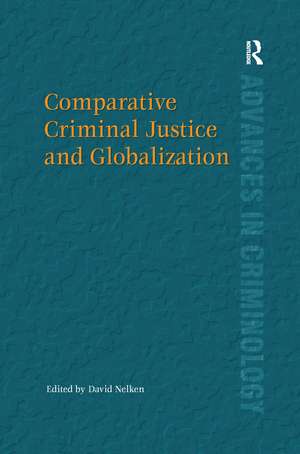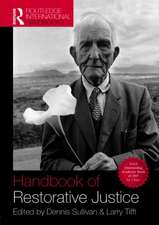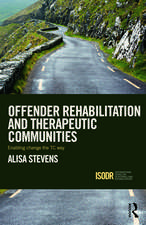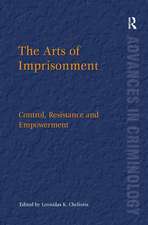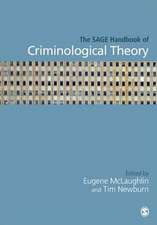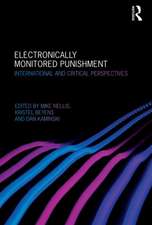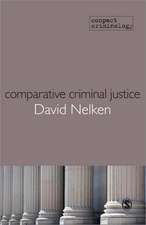Comparative Criminal Justice and Globalization
Editat de David Nelkenen Limba Engleză Paperback – 30 noi 2016
| Toate formatele și edițiile | Preț | Express |
|---|---|---|
| Paperback (1) | 364.22 lei 3-5 săpt. | +22.67 lei 4-10 zile |
| Taylor & Francis – 30 noi 2016 | 364.22 lei 3-5 săpt. | +22.67 lei 4-10 zile |
| Hardback (1) | 1058.65 lei 6-8 săpt. | |
| Taylor & Francis – 7 iul 2011 | 1058.65 lei 6-8 săpt. |
Preț: 364.22 lei
Nou
Puncte Express: 546
Preț estimativ în valută:
69.70€ • 75.69$ • 58.55£
69.70€ • 75.69$ • 58.55£
Carte disponibilă
Livrare economică 01-15 aprilie
Livrare express 15-21 martie pentru 32.66 lei
Preluare comenzi: 021 569.72.76
Specificații
ISBN-13: 9781138254381
ISBN-10: 113825438X
Pagini: 232
Dimensiuni: 156 x 234 x 20 mm
Greutate: 0.45 kg
Ediția:1
Editura: Taylor & Francis
Colecția Routledge
Locul publicării:Oxford, United Kingdom
ISBN-10: 113825438X
Pagini: 232
Dimensiuni: 156 x 234 x 20 mm
Greutate: 0.45 kg
Ediția:1
Editura: Taylor & Francis
Colecția Routledge
Locul publicării:Oxford, United Kingdom
Notă biografică
David Nelken is Distinguished Professor of Sociology at the University of Macerata, Italy and Distinguished Professor of Law, Cardiff University, UK. Dr Nelken is the recipient of the ISA-RCSL Adam Podgórecki Prize 2011, for outstanding achievements in socio-legal research, in the form of distinguished and outstanding lifetime achievement.
Recenzii
'Comparative Criminal Justice and Globalization imaginatively juxtaposes work by leading contemporary scholars of two usually separate subjects. Editor David Nelken's incisive, nuanced opening and closing essays provide analytical and conceptual frameworks that will shape understanding, and future research and writing, for years to come.' Michael Tonry, University of Minnesota, USA 'Globalization represents the next horizon for comparative studies of crime and justice, posing new theoretical and practical challenges but also opening up exciting opportunities for methodological innovation, policy interventions and disciplinary renewal. The contributors to this volume, all household names in the field, explore the implications of globalization for criminality, policing, criminal process and penality, and in so doing help us to understand contemporary social realities and glimpse criminology’s possible futures.' Paul Roberts, University of Nottingham, UK and University of New South Wales, Australia 'This book [...] demonstrates that comparative and global criminology can not only add cohesion and urgency to criminology as a whole, but it can also serve as a bridge to other related disciplines.' British Journal of Criminology
Cuprins
Introduction: Comparative Criminal Justice and the Challenge of Globalisation, David Nelken; Part I Studying Criminal Justice Comparatively; Chapter 1 1Another version of this chapter has been published as ., David Nelken; Chapter 2 1My thanks to Nicola Lacey and Paul Rock for characteristically constructive criticism., David Downes; Chapter 3 Comparing Criminal Process as Part of Legal Culture, Chrisje Brants; Part II The Globalization of Crime and Punishment; Chapter 4 1This chapter is based on a paper presented at the 2007 joint conference of the Law and Society Association, Research Committee on Sociology of Law (ISA), Gesellschaft für Rechtssoziologie, and Sektion Rechtssoziologie (DGS) in Berlin. Comments are welcome to the author at savel001@umn.edu., Joachim J. Savelsberg; Chapter 5 On Globalisation and Exceptionalism, John Muncie; Chapter 6 Exit: The State. Globalisation, State Failure and Crime, Susanne Karstedt; Part III New Disciplinary Agendas; Chapter 7 Critical Cosmopolitanism and Global Criminology, René Van Swaaningen; Chapter 8 Transnational and Comparative Criminology Reconsidered, James Sheptycki; Chapter 9 Comparative Criminology and Global Criminology as Complementary Projects, David O. Friedrichs; Chapter 10 Afterword: Studying Criminal Justice in Globalising Times, David Nelken;
Descriere
In this exciting and topical collection, leading scholars discuss the implications of globalisation for the fields of comparative criminology and criminal justice. How far does it still make sense to distinguish nation states, for example in comparing prison rates? Is globalisation best treated as an inevitable trend or as an interactive process? How can globalisation's effects on space and borders be conceptualised? How does it help to create norms and exceptions? The editor, David Nelken, is a Distinguished Scholar of both Law and Sociology.
